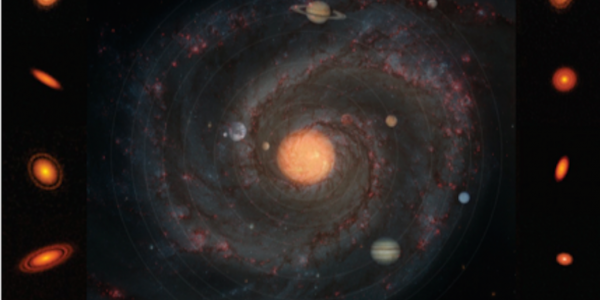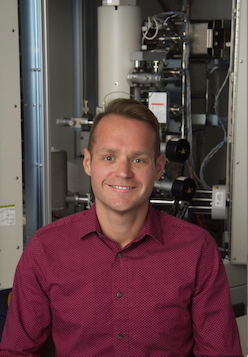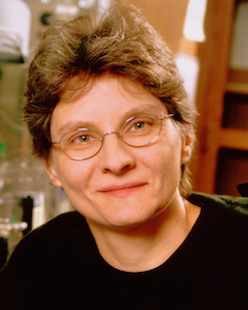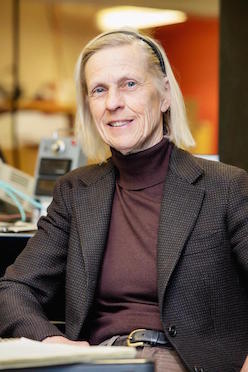Distinguished Panel Discussion - From Starlight to Stardust: Perspectives on the Formation of Planetary Systems
The four panelists will share their perspectives and approaches for investigating the origin of the solar system and other similar planetary systems. Following introductory statements, the panelists will answer questions from the audience and discuss current issues in understanding the processes that led to our solar system.
Ilse Cleeves, Assistant Professor, Department of Astronomy, University of Virginia; recipient of the Annie Jump Cannon Award in Astronomy 2018
Professor Cleeves received a B.S. in Physics from Rice University, a Ph.D. at the University of Michigan, Ann Arbor, and was a Hubble Fellow at the Smithsonian Astrophysical Observatory in the Radio and Geoastronomy Division before taking a faculty position at the University of Virginia.
Her research focuses on understanding the molecular and physical origins of planetary systems such as our own. Using clues from interstellar molecular emission, she studies young planetary systems in formation around low-mass stars, i.e. protoplanetary disks, incorporating knowledge of the primitive solar nebula from the cometary and meteoritic record. Her work is guided by observational results from the Atacama Large Millimeter/Submillimeter Array, the Submillimeter Array as well as the Herschel Space Observatory.
Pierre Haenecour, Assistant Professor, Lunar & Planetary Laboratory, The University of Arizona; recipient of the Meteoritical Society Early Career Scientist Award 2017
Professor Haenecour grew up in Brussels (Belgium) and graduated with B.A. and M.S. degrees in Geology and Geochemistry from the Free University of Brussels. He then moved to St. Louis (Missouri) and obtained a M.A. degree and a Ph.D. in Earth and Planetary Sciences from Washington University in St. Louis.
His background is in geochemistry and cosmochemistry, from terrestrial samples (e.g., Pb and Zn isotopes in Archean komatiitic lava flows) to primitive extraterrestrial samples (e.g., meteorites and micrometeorites), using a variety of analytical techniques (e.g., multi-collector inductively coupled plasma mass spectrometry and secondary ion mass spectrometry, Auger and Raman spectroscopy, and electron microscopy). At the University of Arizona, his research interests focus on the identification and coordinated micro-analytical study of circumstellar (presolar) grains and organics in primitive planetary materials, such as meteorites, micrometeorites and interplanetary dust particles.
Professor Lodders received her Dr. rer. nat (Ph.D.) in Nuclear Chemistry at Johannes Gutenberg University, Mainz, Germany, and Max Planck-Institute for Chemistry, Otto Hahn Institute, Cosmochemistry Division.
Her research in astronomy, cosmochemistry, and planetary sciences focuses on the abundances of the chemical elements in different astronomical environments. She models the distribution of the elements between gases and condensed phases during the formation of planetary building blocks in the protoplanetary accretion disk, the formation of star dust from evolved stars, and the chemistry in the atmospheres of the gas giant planets, exoplanets, brown dwarfs, and low-mass stars. Lodders is the lead author of two books: The Planetary Scientist's Companion, Oxford University Press, 1998 and Chemistry of the Solar System, Royal Society of Chemistry, 2011 (both with Bruce Fegley, Jr.) and over 100 refereed scientific papers.
Lucy Ziurys, Professor of Chemistry/Biochemistry and Astronomy, Department of Astronomy and Steward Observatory, The University of Arizona; Elizabeth and Keith Hege Galileo Circle Fellow 2012
Professor Ziurys is at the University of Arizona with joint appointments in the departments of Astronomy and Chemistry, and the Steward Observatory. She received a B.S. from Rice University and a Ph.D. from the University of California, Berkeley, in Physical Chemistry.
She specializes in interstellar chemistry, mm/sub-mm high resolution laboratory molecular spectroscopy, millimeter/sub-millimeter observations of interstellar molecules, and millimeter-wave devices for astronomical and laboratory applications. Her research group studies radioastronomical observations of molecules in the interstellar medium and laboratory microwave and millimeter/sub-millimeter wave spectroscopy. Molecules include metal-containing species of astrophysical and organometallic interest, as well as organic compounds of prebiotic interest, including those containing phosphorus.
The event is organized by the McDonnell Center for the Space Sciences. Brad Jolliff, Scott Rudolph Professor of Earth and Planetary Sciences and director of the McDonnell Center, and Ryan Ogliore, Assistant Professor of Physics, will moderate the panel discussion.
Recording




